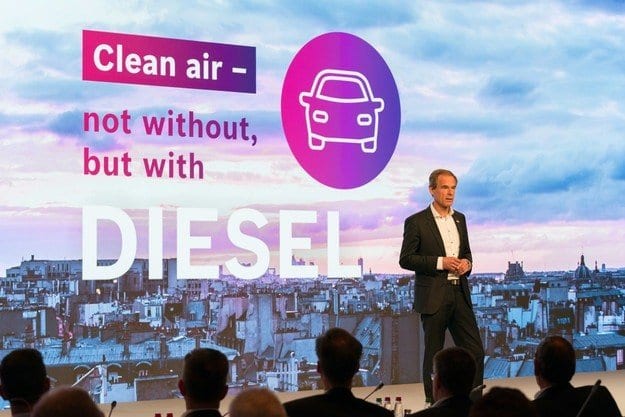
Test Drive New Bosch Diesel Technology Solves Problem

Retains its advantages in terms of fuel consumption and environmental protection.
“Diesel has a future. Today, we want to put an end to the debate about the end of diesel technology once and for all.” With these words, Bosch CEO Dr. Volkmar Döhner announced a decisive breakthrough in diesel technology in his speech at the Bosch Group's annual press conference. Bosch's new developments will enable carmakers to cut nitrogen oxide (NOx) emissions so dramatically that they will meet more stringent limits. In Real Emissions (RDE) tests, the performance of vehicles equipped with Bosch's advanced diesel technology is well below not only those currently permitted, but also those planned to be introduced in 2020. Bosch engineers have achieved these figures. results by improving existing technologies. There is no need for additional components that would increase costs. “Bosch is pushing the boundaries of what is technically feasible,” Denner said. "Equipped with the latest Bosch technology, diesel vehicles will be classified as low emission vehicles at an affordable price." The head of Bosch also called for greater transparency regarding CO2 emissions from road traffic. To do this, it is necessary to measure future fuel consumption and CO2 emissions in real road conditions.
Record values under normal road conditions: 13 milligrams of nitrogen oxides per kilometer.
Since 2017, European legislation requires that new passenger car models that are tested in accordance with an RDE-compliant combination of urban, extra-urban and road trips emit no more than 168 mg of NOx per kilometer. By 2020, this limit will be reduced to 120 mg. But even today, vehicles equipped with Bosch diesel technology reach a measly 13mg of NOx on standard RDE routes. This is about 1/10 of the limit that will apply after 2020. And even when driving in particularly difficult urban conditions, where test parameters exceed legal requirements, the average emissions of the tested Bosch vehicles are only 40 mg/km. Bosch engineers have achieved this decisive technical breakthrough in the past few months. Low values are made possible by a combination of modern fuel injection technology, a newly developed airflow control system and intelligent temperature control. NOx emissions now stay below acceptable levels in all driving situations, whether hard acceleration or light car crawl, cold or hot, on highways or busy city streets. “Diesel vehicles will retain their place and advantage in urban traffic,” Dener said.
Bosch demonstrates proof of its innovative progress with a specially organized test drive in Stuttgart. Dozens of journalists, both from Germany and abroad, had the opportunity to drive test vehicles equipped with mobile meters in the busy city of Stuttgart. Details of the route and the results achieved by the journalists can be found here. Since NOx abatement measures do not have a significant impact on fuel consumption, diesel fuel retains its comparative advantages in terms of fuel economy, CO2 emissions and therefore contributes to environmental protection.
Artificial intelligence can further increase the power of internal combustion engines
Even with such technological advances, the diesel engine has not yet reached its full development potential. Bosch intends to use artificial intelligence to update its latest achievements. This will be another step towards the important goal of developing an internal combustion engine that (with the exception of CO2) will have little to no effect on the surrounding air. “We firmly believe that the diesel engine will continue to play an important role in the transport of the future. “As electric vehicles enter the mass market, we will need these highly efficient internal combustion engines.” The ambitious goal for Bosch engineers is to develop a new generation of diesel and gasoline engines that will not emit significant particulate matter and NOx emissions. Even in one of Stuttgart's most polluted areas, the Neckartor, future internal combustion engines must not emit more than 1 microgram of nitrogen oxides per cubic meter of ambient air, equivalent to 2,5% of today's maximum of 40 micrograms. per cubic meter.
Bosch wants to move forward – transparent and realistic tests for fuel consumption and CO2
Dener also called for attention to CO2 emissions directly related to fuel consumption. He said fuel consumption tests should no longer be done in a lab, but in real driving conditions. This could create a system comparable to that used to measure emissions. “This means more transparency for consumers and more targeted action to protect the environment,” Dener said. In addition, any estimate of CO2 emissions must go well beyond the fuel tank or battery: “We need a transparent estimate of total CO2 emissions from road traffic, including not only emissions from the vehicles themselves, but also emissions from the production of the fuel or electricity used to power them. nutrition,” Dener said. He added that the combined analysis of CO2 emissions would provide drivers of electric vehicles with a more realistic picture of the environmental impact of these vehicles. At the same time, the use of non-fossil fuels could further reduce CO2 emissions from internal combustion engines.
Bosch Product Code - Ethical Technology Design
Denner, who is also directly responsible for research and development, also introduced the Bosch Product Development Code. First, the code strictly forbids the inclusion of functions that automatically detect test loops. Secondly, Bosch products do not need to be optimized for test situations. Thirdly, the daily use of Bosch products must protect human life, as well as protect resources and the environment to the maximum extent possible. “In addition, our actions are guided by the principle of legality and our motto “Technology for Life”. In contentious cases, the values of Bosch take precedence over the wishes of the customers,” Dener explained. For example, since mid-2017, Bosch is no longer involved in European customer projects for gasoline engines that do not have a particulate filter. By the end of 70, 000 employees, mostly from the R&D sector, will be trained in the principles of the new code in the most comprehensive training program in the company's 2018-year history.
Technical questions and answers about new Bosch diesel technology
• What are the distinguishing features of the new diesel technology?
To date, the reduction of NOx emissions from diesel vehicles has been hampered by two factors. The first is driving style. The technology solution developed by Bosch is a high-performance engine airflow management system. A dynamic driving style requires even more dynamic exhaust gas recirculation. This can be achieved with an RDE-optimized turbocharger that responds faster than conventional turbochargers. Thanks to the combined high and low pressure exhaust gas recirculation, the airflow management system becomes even more flexible. This means that the driver can press hard on the gas without a sudden spike in emissions. Temperature also has a very big influence.
To ensure optimal NOx conversion, the exhaust gas temperature must be above 200 °C. When driving in the city, cars often do not reach this temperature. That's why Bosch has opted for an intelligent diesel engine management system. It actively regulates the temperature of the exhaust gases - the exhaust system remains hot enough to operate in a stable temperature range, and emissions remain low.
• When will the new technology be ready for serial production?
The new Bosch diesel system is based on components already on the market. Now it is available to customers and can be included in mass production.
• Why is driving in a city more challenging than driving out of town or on the highway?
To ensure optimal NOx conversion, the exhaust gas temperature must be above 200 ° C. This temperature is often not reached in urban driving, when cars crawl through traffic jams and constantly stop and start. As a result, the exhaust system cools down. The new Bosch Thermal Management System solves this problem by actively regulating the exhaust gas temperature.
• Does the new thermostat require an additional 48V exhaust heater or similar additional components?
The new Bosch diesel system is based on components already on the market and does not require an additional 48 V on-board electrical system.
• Will new Bosch technologies make the diesel engine much more expensive?
Bosch diesel technology is based on available components that have already been tested in series production vehicles. The decisive breakthrough comes from the innovative combination of existing elements. Reducing emissions will not increase the cost of diesel vehicles as no additional equipment components are required.
• Will the diesel engine lose its benefits in terms of fuel economy and climate protection?
No. The goal of our engineers was clear – to reduce NOx emissions while maintaining the advantage of diesel fuel in terms of CO2 emissions. Thus, diesel fuel retains its beneficial role in climate protection.
